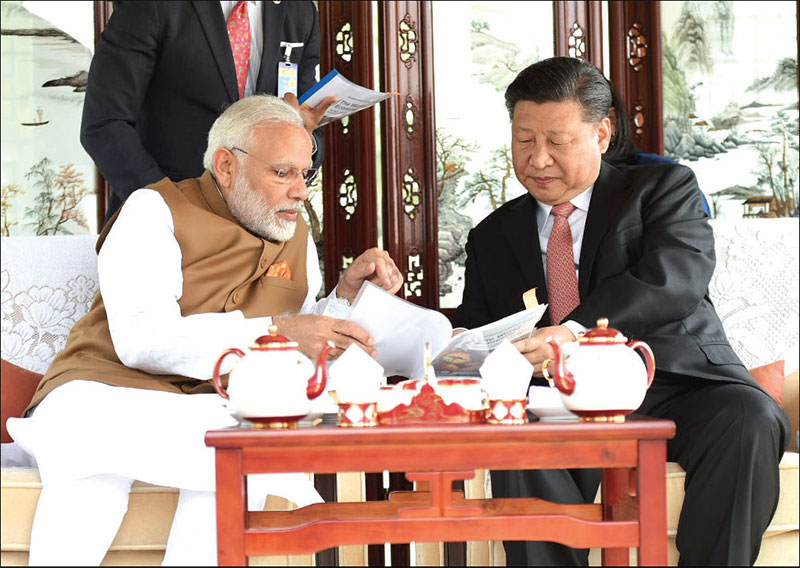The shadow of August 5 will loom over the upcoming Modi-Xi summit
Pravin Sawhney
Writing in the New York Times, Pakistan Prime Minister Imran Khan has demanded that India abrogate the J&K Reorganisation Act 2019 which comes into effect on October 31. Not doing so could lead to conflict. What could be the basis of his temerity? Not the support of his army chief, General Qamar Bajwa, or the latter’s assessment of India’s unpreparedness for war.

Khan’s confidence comes from the recent visit of Chinese, Vice-Chairman, Central Military Commission (CMC), General Xu Qiliang who led a powerful delegation comprising all wings of the People’s Liberation Army (PLA) to Pakistan two days before Khan’s ultimatum on Kashmir. How seriously should Xu’s Pakistan visit be taken, especially when Khan’s demand, sounding outlandish, got little credence in India?
Xu, as number two to Chairman CMC, Xi Jinping and his confidante (their association goes back a long way when they worked in Fujian province), runs the PLA. Serving his third term as a CMC member, Xu, as the deputy secretary of the CMC’s ‘reform leading group’, was responsible for PLA’s 2015 military reforms which spurred the US to focus — after 16 years of counter-terror operations — on state-on-state wars. As the first PLA Air Force (PLAAF) head to be appointed to the CMC, Xu is responsible for the Shaheen series of annual air exercise between PLAAF and Pakistan Air Force in north Ladakh. Coincidently, Shaheen-VII — with the purpose of building interoperability (ability to fight together on common missions) — was being conducted in the Chinese city of Holton, 300km north of Leh, with PAF fighters taking off from Skardu in Gilgit-Baltistan, during Xu’s visit to Pakistan.
Shaheen series started soon after December 2010 when on the eve of Chinese Premier Wen Jiabao’s visit to India, Beijing announced that its border with India was a mere 2,000km (India insists it is 3,488km). China excluded Ladakh. Incidentally, north Ladakh, with poor and mostly non-existent infrastructure, is a serious vulnerability of the Indian military.
Xu’s Pakistan visit, given the timing, had two purposes. The first was to convey Xi’s full support for Pakistan’s core concern (Kashmir). Xu came to tell Pakistan that Kashmir would be Xi’s topmost agenda point when he meets Prime Minister Narendra Modi on October 11 in India to take the Wuhan understanding forward. The meeting would be held three weeks before the Kashmir Act comes into effect.
Xu met Pakistan President Arif Alvi, Prime Minister Imran Khan, Chairman of the Joint Chiefs of Staff Committee, Gen. Zubair Mahmood Hayat, Chief of Army Staff, Gen. Qamar Javed Bajwa, Chief of Naval Staff, Admiral Zafar Mahmood Abbasi and Chief of Air Staff, Air Chief Marshal Mujahid Anwar Khan. Meeting the top political and military leadership individually is unprecedented and is reflective of the close bond between Pakistan and China since the declaration of the 2013 China Pakistan Economic Corridor.
The other purpose of Xu’s visit was to sign 10 memorandum of understanding for Pakistan military’s capacity building. With PLA support for capacity (war materiel) and capability (interoperability) building with Pakistan, the realistic threat facing India is neither one front (Pakistan) nor two-fronts (Pakistan and China), but a collusive front — Pakistan military supported by PLA’s non-kinetic capabilities comprising cyber, electronic and space warfare.
The PLA could disrupt or debilitate India’s power and telecommunication grids and satellite communications — most of which use Chinese components as they are inexpensive — with its impressive cyber offensive capabilities and throw normal life completely out of gear. India is not prepared for this eventuality. Or a few PLA contingents could cross the Line of Actual Control, as they did in Depsang in 2013, and simply sit there with hot food and logistics being provided by its rear. Evicting them physically would mean war; not doing so would amount to national humiliation.
China does not need to go to war with India since its military coercion (given the huge disparity in military powers) is enough to meet its objectives. A top Chinese objective during Xi visit could be restoration of status quo — what Khan is demanding — in Kashmir. Chinese foreign minister, Wang Yi, had, while meeting his Pakistani counterpart, Shah Mahmood Qureshi on August 9 in Beijing, said, ‘China believes that unilateral actions (by India) that will complicate the situation should not be taken.’ China has expressed its displeasure both at the revocation of articles 370 and 35A, and the creation of two union territories.
Why a strong Chinese reaction was not anticipated and taken into account by Delhi is difficult to understand. Perhaps, the Modi government believing in its own invincibility and that of the armed forces had felt that the passage of the Kashmir Bill through the Parliament would be enough to make momentous changes. Moreover, China, given its numerous distractions like US trade war, Hongkong, One Belt One Road etc, would, like earlier times, pay lip service to Pakistan. Also, China would not jeopardise its nearly USD 90 billion annual trade with India. Furthermore, once other major powers accept India’s position, China would, in its wisdom, keep quiet. The upcoming second Wuhan informal summit is likely to prove India’s assessment (if one was done) wrong.
You must be logged in to view this content.

